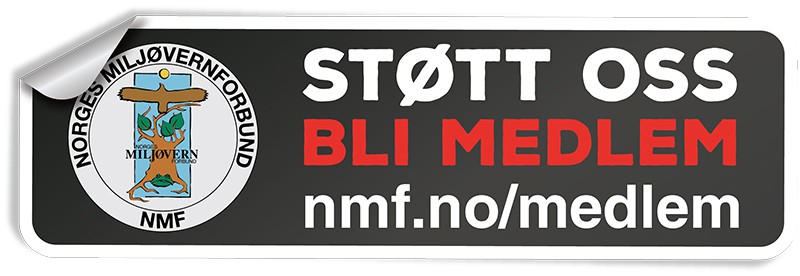Opponents of wind power use the sledgehammer. The Norwegian Environmental Protection Association, led by leader Kurt Oddekalv, demonstrated on Monday morning against German industry's involvement in destroying Norway with intense wind power development. The environmental organization had a demonstration in front of the German embassy where they dished out a BMW, a symbol of German quality, and built in Bavaria, where Stadtwerke München has its headquarters.
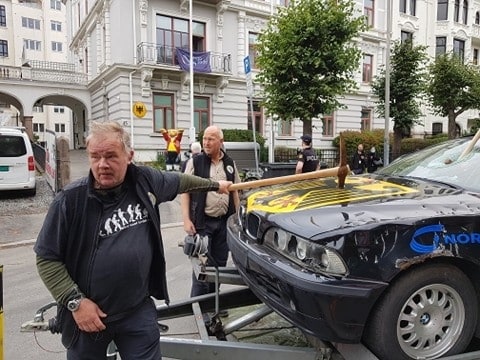
Kurt Oddekalv, leader of the Norwegian Environmental Protection Association, has planted the spike in the hood of the BMW during the demonstration against wind power in front of the German embassy. Photo: NMF
This is a demonstration to draw attention to how much the wind power industry destroys Norwegian nature, health and wildlife. Germany is the country with the most ownership interests and activities related to the demolition of Norway. Stadtwerke München is one of the biggest players. The smashing of the BMW is a clear message to the few who destroy too many people in Norway. We are not demonstrating against the German people, they are our allies, says Kurt Oddekalv.
German companies are heavily involved in the development of wind power in Norway, both as owners and as equipment suppliers. This is the largest and most destructive energy project of all time, consuming more of the Norwegian landscape than anything before in history. Pristine wilderness and unique natural areas are now being converted, with excavators and dynamite, into giant noisy industrial installations. As an energy solution, it destroys the Norwegian energy supply with unstable power and with an underreported and hidden climate cost that also makes this a very bad climate project. Large areas of forest are cut down and bogs are dug up, drained and filled again with rubble and stone. To a large extent, the wind power plants actually remain as a mere climate burden.
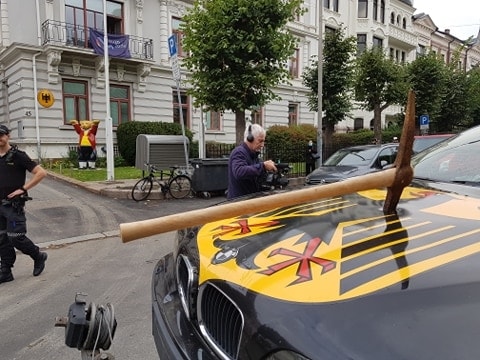
The German "energiwende" has suffered a serious setback. It wasn't as rosy as they had imagined though. While the development of wind power has stagnated in Germany for obvious reasons, such as increased resistance and also due to the expensive and unstable nature of the energy, German companies see their average making good money in the Norwegian landscape. Here they receive both subsidies and an administration that takes too much account of cynical business interests, while individuals, local communities and natural diversity are sacrificed.
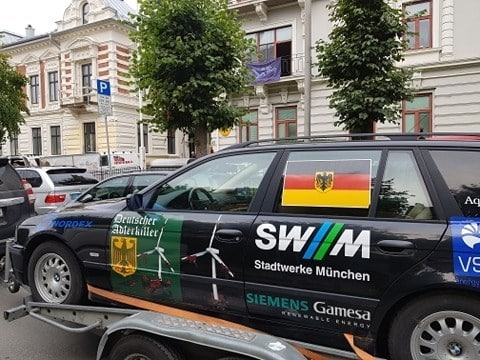
German neocolonialism
Like the colonial powers of old, the German state exercises a form of colonial activity where, through the use of force and means of pressure, they exploit Norway for natural resources via their country's private companies. Considering the German state's pressure on the Norwegian authorities, it is easy to draw parallels to former colonial powers, England and the Netherlands, where the British East India Company controlled large parts of England's colonies and trade with them, and the Netherlands the same through the Dutch East India Company company and the Dutch West India Company.
Similarly, the German companies Prime Capital AG, Aquila Capital GmbH and the publicly owned Stadtwerke München are used to handle Germany's colonial interests.
Colonialism is when kingdoms or states conquer, control and exploit an area that is outside their actual territory (area). The new areas are called colonies. Those who acquire colonies are called colonial powers.
Colonialism differs from colonization. Colonization is when groups of people move out on their own initiative or a group's initiative to engage in agriculture or trade. Colonialism is about countries, kingdoms or states that establish colonies that they rule and exploit.
Neo-colonialism or neo-colonialism is a newer form of colonialism where one nation-state dominates another nation-state and exploits its resources without directly controlling the area.
https://snl.no/kolonialisme
The colonial power Germany puts pressure on the Norwegian authorities
That the German state's relationship with Norway can be described as a form of neocolonialism became very clear when Germany's ambassador to Norway, Alfred Grannas, sent an email to the Norwegian state at the Ministry of Oil and Energy (OED) on 26 March. It was a fairly undisguised threat. The case concerns Andmyran Wind Power Plant in Nordland, where NVE had adopted a postponed deadline and an extended concession period. After strong protests and complaints, the case was reversed in the OED. Andmyran wind power plant has changed hands a number of times over the years, and the German fund manager Prime Capital AG bought 100% of the shares on behalf of the group company Prime Scandic S.À.RL, registered in the tax haven of Luxembourg. 26/09/2019.
Now with new German and Luxembourg ownership interests, the German authorities are thus showing their power. Ambassador Grannas comes here with a fairly undisguised threat to the Norwegian authorities:
- I do not think that a long trial in times of crisis right now would have benefited any of the parties here. Even less if this again starts a discussion about a possible risk for foreign investments in Norway in the energy sector.
- Germany's ambassador to Norway, Alfred Grannas
This can hardly be misunderstood. Here, the German state threatens Norway with legal proceedings if the matter cannot be resolved in another way. The ambassador further writes that he wants a dialogue about the matter. If this does not lead to progress, then a long and expensive court case against Norway from Germany awaits.
The German arrogance becomes obvious when, at the same time as exploiting Norway for natural resources to supply more electricity to Germany, Danish wind turbines are paid to NOT produce energy. This has become an absurd parody.
See videos and info about the German capacity problem with wind power in article:
Germans pay to have Danish windmills turned off when it's windy https://www.tvmidtvest.dk/midt-og-vestjylland/tyskere-betaler-faa-slukket-danske-vindmoeller-naar-det-blaeser
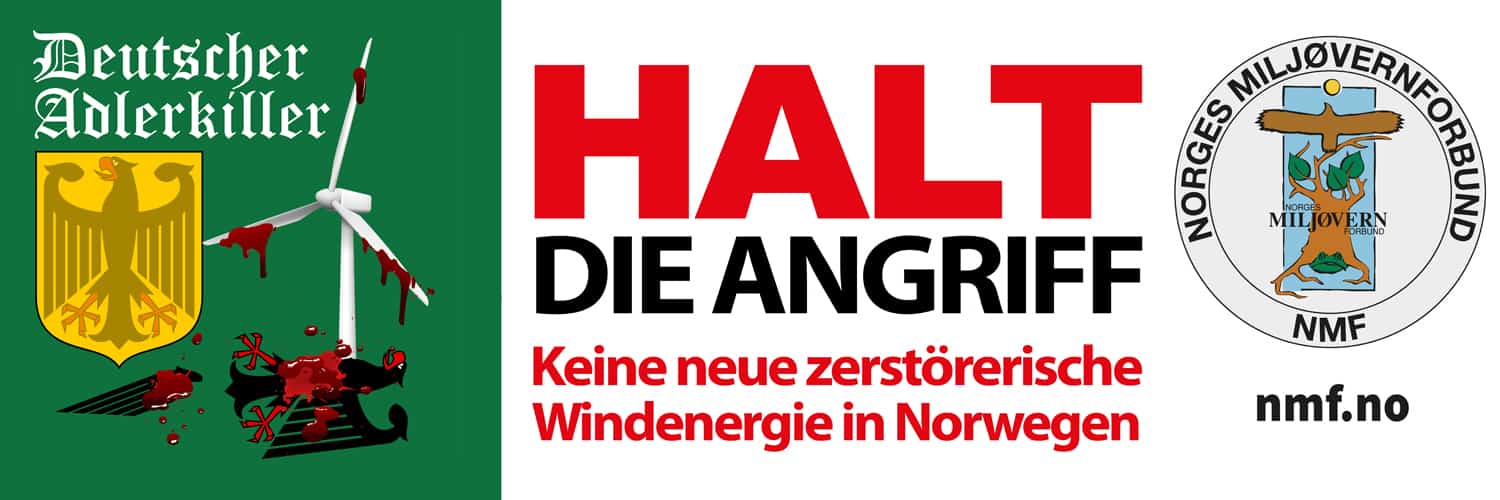
Not the first time Germany threatens Norway
It was no further back than when the Frøya case was up for consideration in the Ministry of Municipal Affairs and Employment (KMD) last year that the German embassy last broke into the proceedings before the decision was made. The meeting with the German embassy was held at KMD on 13/06/2019, but no minutes were written from this meeting, but it is easy to add the same 2 + 2, especially in light of this letter from the German embassy.
- But today I have to get in touch about a problem, which unfortunately is not the first time we have it on the agenda: investment security for foreign (here German) investors in the energy sector in Norway.
- Germany's ambassador to Norway, Alfred Grannas
German authorities' aggression and interference in Norwegian internal affairs must stop. As an environmental organisation, we see every day how shaken the Norwegian administration is in the wind power case. When foreign authorities, on top of it all, put their finger on the scales through pressure and threats, it is simply too much.
BMW, the pride of Bavaria
BMW is the pride of Bavaria and Germany. It is symbolic as it is the Bavarian capital Munich's own energy plant, Stadtwerke München (SWM), which is among the most aggressive for development on Norwegian soil. Paradoxically, it is at the same time Bavaria that has the absolute strictest regulations for development in the whole of Germany, and has itself preserved most of its own landscape free of wind power. development and at the same time insist on building out as much as possible of what they themselves do not want around their own living room window here in the colony, Norway.
At the same time, the paradox is that it is in southern Germany that they have the greatest need for energy, while in northern Germany they have a huge surplus when it is very windy.
Paying Denmark to stop wind power production
Due to the far too low transmission capacity on the line network between north and south, the German state chooses to pay several of the Danish wind power plants to stand still and NOT produce. At the same time as this, the German authorities are pressuring the Norwegian authorities to build out more of the same unstable wind power they themselves do not want more of. Is it any wonder that we in Norway get cursed?
We've had hard German heels in Norway once before, and we don't want them back, says Kurt Oddekalv, head of the Norwegian Environmental Protection Association.
Download the press release here: http://984072-www.web.tornado-node.net/wp-content/uploads/2020/09/NMF_pressemelding_demonstrasjon_tysklands_ambassade-3.pdf
Watch a film from the crush here:

